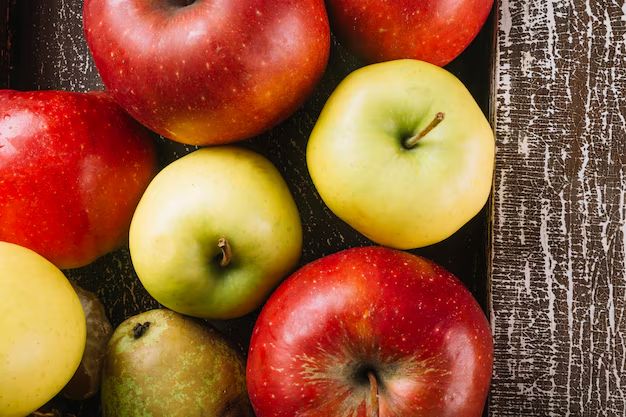🍏 Understanding the Shelf Life of Apples in Your Refrigerator
Apples are a staple fruit in many households, beloved for their crisp texture, diverse flavors, and nutritional benefits. But once they enter your kitchen, how long can you count on them staying fresh? Storing apples in the refrigerator certainly helps extend their life, but there's more to know to maximize their longevity and enjoyment. Let's delve into the science and art of keeping your apples fresh in the fridge.
Why Store Apples in the Refrigerator?
The refrigerator can be a powerful ally in prolonging the life of fresh produce. For apples, the cool temperatures slow down the ripening process, helping to preserve texture and flavor. But why does this happen, and what's the best way to do it?
The Science Behind Refrigerated Storage
- Temperature Control: Apples are typically stored at around 32-34°F. This range slows down the degradation of cell structures and the growth of bacteria, keeping the apples from becoming mushy or spoiling quickly.
- Reduced Ethylene Production: Apples naturally emit ethylene gas, a compound that accelerates ripening. Refrigeration decreases ethylene production, extending freshness.
- Optimal Humidity: Refrigerators offer controlled humidity levels that minimize moisture loss, which can otherwise lead to shriveling.
Benefits of Refrigerated Apples
- Longevity: Apples stored in the fridge can last up to four to six weeks, depending on the variety.
- Preserved Texture: They stay firm and crunchy.
- Flavor Retention: Maintaining their sweet and tart balance longer.
Best Practices for Storing Apples in the Refrigerator
Storing apples isn't as simple as just popping them in the fridge. Several tips and tricks can help you get the most out of your apple storage.
Selecting the Right Apples
- Choose Firm Fruits: Before purchasing, give apples a gentle squeeze. Select only those that feel firm and have no visible bruises or blemishes.
- Pick the Right Variety: Some apples like Gala, Fuji, and Granny Smith tend to last longer in storage compared to softer varieties like McIntosh.
Storage Techniques
- Separate from Other Produce: Keep apples away from other fruits and vegetables. The ethylene gas they emit can cause surrounding produce to spoil faster.
- Use Plastic Bags: Store apples in perforated plastic bags to maintain moisture while allowing some air circulation.
- Crisper Drawer: Utilize the refrigerator's crisper drawer to maintain consistent temperature and humidity.
Can Refrigerated Apples Go Bad?
Despite your best efforts, no food lasts forever. Here’s how you can tell your apples have reached their limit:
Signs of Spoilage
- Discoloration: Brown spots or a dull, matte surface may indicate the apple is past its prime.
- Soft Spots and Wrinkles: These suggest water loss and cell breakdown.
- Off Smell: A fermented or musty smell can signal spoilage.
Food Safety Considerations
While rare, spoiled apples can harbor harmful bacteria. It's always better to err on the side of caution and discard questionable fruits.
Factors Affecting Apple Shelf Life
While refrigeration extends the freshness of apples, several factors can impact just how long they last.
Variety Differences
Different apple varieties have different shelf lives due to their sugar content, acid balance, and density. For a quick guide:
- Long Lasting: Fuji, Granny Smith, and Honeycrisp
- Moderate Shelf Life: Red Delicious, Golden Delicious
- Shorter Shelf Life: McIntosh, Cortland
Ripeness at Purchase
The ripeness level at the point of purchase influences longevity. Less ripe apples last longer, as they have more time before full ripeness leads to overripeness.
🍎 Sweet Takeaways for Apple Storage
Here’s a quick summary of essential tips to keep your apples fresh:
- Keep Cool: Store apples between 32-34°F.
- Choose Right: Opt for firm, unblemished apples.
- Use Perforated Bags: Maintain moisture without suffocating the fruit.
- Separate Produce: Avoid placing apples with ethylene-sensitive fruits.
- Check Often: Regularly inspect for signs of spoilage.
Exploring Beyond Shelf Life: Delicious Uses for Apples
If you're nearing the end of an apple's freshness, consider enhancing its use in your kitchen.
Creative Apple Recipes
- Baking Delights: Use older apples in pies, crisps, and muffins where texture isn't crucial.
- Savory Dishes: Enhance salads, stuffings, or roast with slighty aging apples for a touch of sweetness.
- Preserves: Turn overripe apples into jam, jelly, or apple sauce.
Beyond Eating: Apples in the Household
Apples can extend beyond culinary uses:
- Natural Air Freshener: Boil apple peels and cores with spices for a cozy home aroma.
- DIY Home Decor: Use dried apple slices as natural decorations.
Reflecting on the Journey of an Apple
From picking the right apple to observing its journey in your refrigerator, understanding the nuances of apple storage can significantly enhance your culinary experience. Not only does it help reduce food waste, but it also ensures that each bite you take is enjoyable and fresh.
The next time you stand in your kitchen, clutching a handful of apples, you'll grasp the delicate balance between patience, planning, and satisfaction. Whether you're savoring the crispness of a freshly stored apple or indulging in a baked creation, each fruit has its story and value. So, wield your knowledge confidently and keep every apple at its best! 🍏

